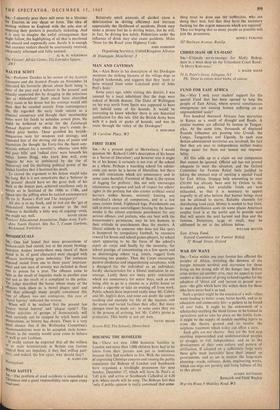WALTER SCOTT
SIR.—Professor Daiches in his review of my Scottish Literature and the Scottish People on November 24 reiterated his favourite phrase about Scott being 'a lover of the past and a believer in the present' and actually supported this by dragging in the notorious 'gas at Abbotsford.' Scott could have electrified every room in his house but his writings would still snow that he recoiled acutely from contemporary life. He regarded the early trade unions as a criminal conspiracy and thought their membership levies were for funds to subsidise armed plots. He could be bothered to write for the Edinburgh 4 mual Register only when the year's events in- cluded juicy battles. These gratified his boyish- antiquarian taste for weapons and strategy, and reminded him of the stirring old days of jousts and Jacobitism (he thought the Forty-five the finest con- ceivable subject for a novelist!). whereas 'corn bills and poor bills' and 'radical riots' were beneath his notice. James Hogg, who knew him well, even suggests he was so embittered by the rise of democracy and the declining political power of the landed families that it hastened his death.
To extend the argument to his fiction would take too long. But is it not remarkable that a 'believer in the present' should, have set the great bulk of his Work in the distant past, achieved excellence only in novels set in Scotland of the 1680s to 1740s, and lapsed into the piffling when he tackled contemporary life (in St. Rottan's Well and The Antiquary)?
All this is in my book, and to trot out the 'gas at Abbotsford' business as a counter to the real evidence is decidedly a bitty way of arguing—even, shire North District, Site No. 7, Conan Gardens, Richmond, Yorkshire


































 Previous page
Previous page